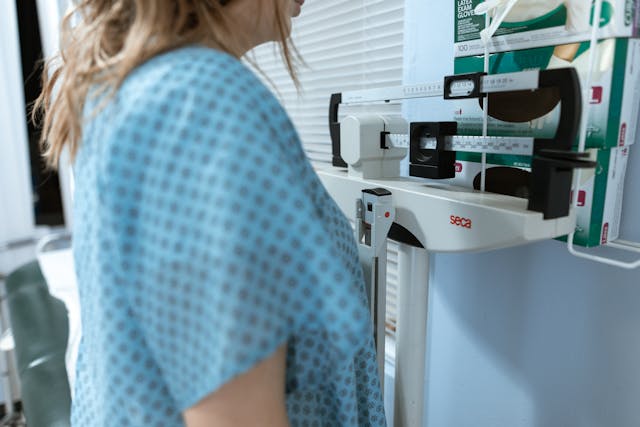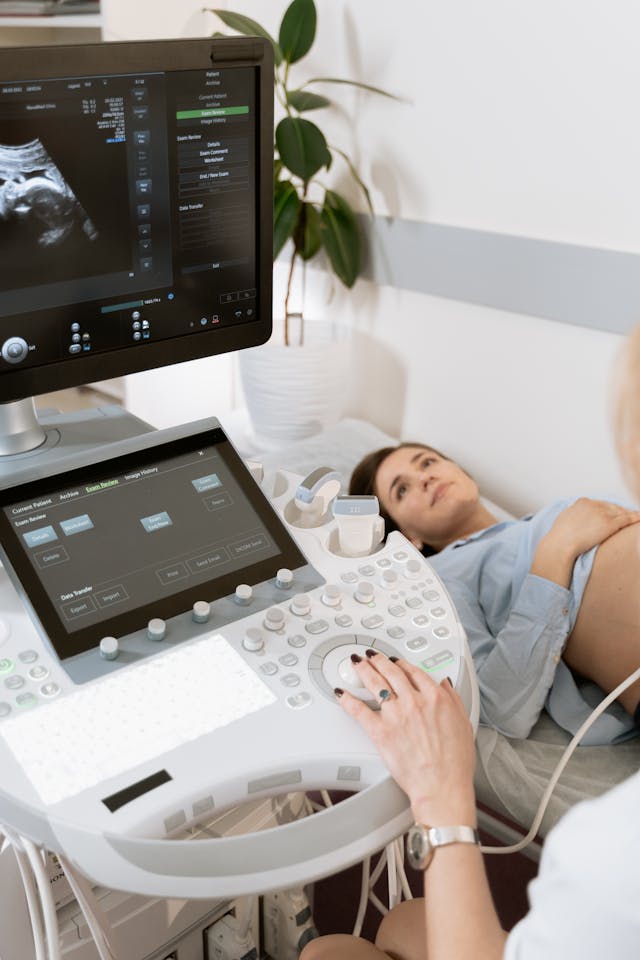Many pregnant women may suffer from Eating disorders in pregnancy as body shape changes may increase anxiety about gaining weight.
Women with eating disorders in pregnancy are in urgent need to be examined frequently during pregnancy and after birth.
Eating disorders in pregnancy may affect some women and sometimes do not change in others.

What are eating disorders?
An eating disorder is considered a mental health condition of unhealthy usage of food in a way that helps you treat your emotions. People with eating disorders may eat too much, or not enough, and always have worries about their weight or body shape.
This can change your life and make you sick, so friends and family should be concerned about you.
Common types of eating disorders include:
- Anorexia
- Bulimia
- Binge eating disorder (BED).
- Other specified feeding or eating disorders (OFSED). In this case, the symptoms differ from different types of eating disorders.
Women with eating disorders in pregnancy are going through a tough time so, getting special support that provides pregnant women with their needs during pregnancy and postpartum.
For some people, pregnancy gives them the chance to recover because they immerse themselves in taking care of their bodies and babies.
Sometimes asking for help or speaking to your GP or midwife can be hard. It’s useful for pregnant women to get support from their partners, family members, and friends during periodic follow-ups if it helps.
Support from your healthcare team can help women with eating disorders in pregnancy to make sure they stay on the right track after birth.
For other women, the body’s and life’s changes during pregnancy can cause old feelings to resurface and sometimes bring up new feelings with wanting to control your life and how you look, through the relationship with food.
The prevalence of eating disorders in pregnancy
Approximately 7.5% of women may be suffering from an eating disorder in pregnancy. Women with eating disorders during pregnancy may be going through a tough time during those months.
The prevalence of eating disorders in pregnancy in the 11 studies involving 2,369,520 pregnant women ranged between 0.5 and 10.6%.
The prevalence of anorexia nervosa and binge eating disorder during pregnancy shows a significant increase compared to pre-pregnancy, and the prevalence of bulimia nervosa during pregnancy decreases.
Eating disorders in pregnancy are more common in women under 30 years of age, half of the pregnant women with eating disorders had anxiety and about one-third had depression.

Symptoms of eating disorders in pregnancy
Many people do not know they have an eating disorder.
The symptoms include:
- Constant worry about weight and body shape
- Avoid social occasions, especially with food, and do not eat a lot
- Taking laxatives
- Exercising a lot
- Having strict habits around food
- Mood changes
- Lack of appetite or interest in food
- Dramatic weight loss
- Upset stomach
- Abdominal pain and gastrointestinal issues with no known cause
- Selective eating gets worse (limited preferred food)
Symptoms in high-risk women with eating disorders:
- Low body mass index.
- Concerned about weight but not overweight.
- Menstrual disturbances or amenorrhoea.
- Gastrointestinal symptoms.
- Physical signs of starvation or repeated vomiting.
- Psychological problems.
Effects of eating disorders in pregnancy
The evidence here is limited and sometimes conflicting. Many studies are retrospective or questionnaire-based.
Other studies are based in hospital clinics, which do not represent community populations.
It seems eating disorders in pregnancy, particularly active anorexia nervosa, carry a slightly greater risk to the mother and the fetus.
Women with bulimia nervosa and women with anorexia nervosa or both disorders found that women with bulimia nervosa were more likely to have a history of miscarriage and those with anorexia nervosa were more likely to have smaller babies compared with the common people.
A comparison of women with a history of anorexia nervosa, bulimia nervosa, atypical eating disorder, and controls in another study found that women with a history of an eating disorder had a higher rate of miscarriage, small for gestational age babies, low birth weight babies, microcephaly babies, growth restriction in the uterus, and premature labor (especially if the mother’s body mass index was <20).
However, a large recent study in Sweden suggests that a history of anorexia nervosa in itself may not be associated with negative birth outcomes.
Maternal problems reported include psychological upset, postnatal depression, anemia, premature labor, respiratory issues, gestational diabetes, and complications during labor.

Eating disorders in pregnancy management
General practitioners do not detect eating disorders. Some researchers acknowledge that only 10% of women with bulimia nervosa are diagnosed and only half of them undergo treatment.
Women are more willing to receive advice and support during regular pregnancy follow-ups and prenatal consultations, which also increases the likelihood of discovering an eating disorder.
Main guidelines for women with eating disorders in pregnancy
Here are some nice guidelines for eating disorders in pregnancy and the necessary care women need before and after pregnancy.
BeforePregnancy:
-
Achieve and maintain a healthy weight.
-
Avoid purging.
-
Consult your healthcare provider for a pre-conception appointment.
-
Follow up with a nutritionist and have a healthy pregnancy diet, that contains multivitamins.
-
Individual or group therapy may be useful through eating disorder counseling and subjecting to appropriate procedures.
During Pregnancy:
-
Schedule a prenatal visit early in your pregnancy and inform your healthcare provider that you have been struggling with an eating disorder.
-
Strive for healthy weight gain.
-
Eat well-balanced meals with all the appropriate nutrients.
-
Follow up with a nutritionist who can work with you to find the healthy food necessary to cover your needs.
-
Avoid purging.
-
Individual or group therapy sessions may be useful for eating disorders and undergoing appropriate needs.
After Pregnancy:
-
Improve physical and mental health through periodic counseling.
-
Tell your surrounding network (health care provider, partner, and friends) about your eating disorder and the increased risk of postpartum depression.
-
Ask for support from those around you and to be available when necessary.
-
Consult a breastfeeding specialist for early help.
-
Follow up with a nutritionist to help you work out to stay healthy, control your weight, and invest in your baby.
In conclusion, make sure you tell your midwife and GP if you have an eating disorder or have had one in the past. This means they can provide you with the right support during and after pregnancy.
You can’t plan for everything when it is time to become a new parent, so it is helpful to talk to family, friends, and your doctor to provide help and advice. Stay well.
Read more about:


You must be logged in to post a comment.